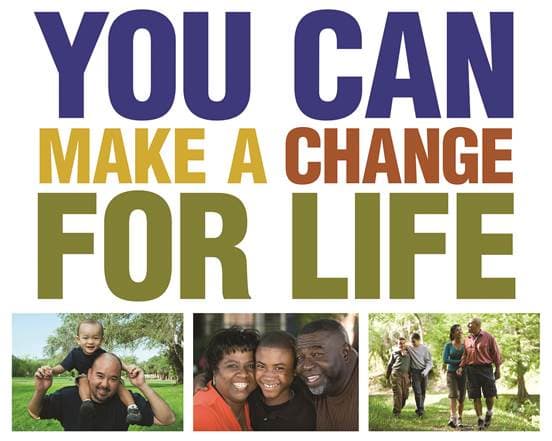Diabetes Prevention Added to a Statewide Referral System

Submission Date: August 2014
Entry Type: Case Study
State/Territory Submitted on the Behalf of: Washington
States/Territories Involved: Washington
Other Funding:NACDD funding
Domain Addressed:Community-Clinical Linkages
Public Health Issue:- 86 million (more than 1 out of 3) American adults have prediabetes, and 9 out of 10 people with prediabetes do not know they have it. Without lifestyle changes to improve their health, 15 – 30% of people with prediabetes will develop type 2 diabetes within five years.
- The Diabetes Prevention Program research study showed that making modest behavior changes helped participants lose 5 – 7% of their body weight and reduced the risk of developing type 2 diabetes by 58% in people with prediabetes.
- Developing and implementing systems for referral of people at risk to sites offering the lifestyle change program is a sustainable strategy to increase use of this program.
To implement a statewide referral system in partnership with WIN211.
Program Action:The Washington Diabetes Prevention and Control Program (DPCP), as part of the state Heart, Stroke and Diabetes Program, partnered with a statewide referral system called the Washington Information Network (WIN211) to add the evidence-based lifestyle change program and other health education programs to their 211 database. WIN211 is a statewide telephone system connecting residents with regional call centers for health and human services information. The State linked the providers of the evidence-based lifestyle change program to WIN211 and helped them provide their program information to this statewide referral system. Washington residents can go to the website (www.win211.org) or call WIN211 to speak to live phone specialists who will provide information on diabetes prevention and the availability of an evidence-based lifestyle change program in their area.
The State Health Department chose to partner with WIN211 because of its strong reputation within Washington state, its endorsement from the state legislature and its ability to reach residents statewide. Through work with the State, WIN211 added health education programs to their menu of resources, including evidence-based programs (EBPs) such as the evidence-based lifestyle change program, Diabetes Self-Management Education (DSME), and the Stanford Chronic Disease Self-Management Program. Because WIN211 was well-developed and well-known within the state, adding the health education content was simple and cost-effective. In order to promote the evidence-based lifestyle change program and the WIN211 referral system, the State Health Department modified CDC diabetes prevention awareness materials to include a “Call WIN211 logo” and message. These materials were then distributed by WIN211 call center staff at outreach events and by request.
“With strong partnerships at the local and national level, we were able to develop a sustainable referral system for DPP in Washington. It wasn’t always easy, but having a shared vision, endurance
State Health Department Roles
- Managed the WIN211 contract and served as the state point of contact for their staff
- Coordinated efforts to add the evidence-based lifestyle change program to WIN211 listings
- Promoted WIN211 as a referral system to other evidence-based providers and programs
- Communicated weekly with WIN211 management and staff to provide technical assistance and troubleshoot
- Encouraged new evidence-based lifestyle change program providers to provide program information to WIN211
- Adapted CDC marketing materials to include the WIN211 initiative
- Provided promotional materials for public outreach events
- Recognized the necessity to provide a bridge to diabetes self-management education (DSME) and diabetes prevention
Partners
- WIN 211
- Evidence-based lifestyle change program providers
- Other evidence-based program partners and providers
- Washington State Diabetes Network
- 20 evidence-based lifestyle change program listings on WIN211
- 33 DSME listings on WIN211
- 386 Outreach events
- 9,142 Promotional materials distributed by WIN211 staff
- 18 System partners
- 1.6 million Adults with prediabetes living in the area covered by the referral system
Factors Supporting Success
- Dedicated Funding: $110,000
- An existing statewide referral system, such as WIN211
- Ability to execute state contracts with partners
- Utilized a well-known and reputable referral system that was endorsed by the state legislature as the official state referral system
- Tailored existing CDC awareness materials for the audience and used them to promote diabetes prevention awareness and the WIN211 system
- Maintained close contact with WIN211 management and staff to troubleshoot any issues
- Washington Diabetes Network Leadership Team supported the project
Challenges and Solutions
Challenge: Organizations were unsure of the value of being included in WIN211 listings
Solution: Helped organizations without prior experience with WIN211 see the value; soon others followed
Challenge: Loss of some essential staff due to CDC budget cuts caused setbacks in promotion
Solution: Incorporating efforts to promote other EBPs opened new funding avenues
Challenge: The submission of new programs to the WIN211 listings was slow
Solution: WIN211 staff initiated calls to invite EBP providers to add their program information to the WIN211 database
- Continue contracting with WIN211 as funding allows.
- Work with WIN211 to obtain outside (private) grant funds to support this work.
- Expand offerings under “health education” to more topics, and with those topic areas, bring additional funds or increase sustainability of funding.
https://www.chronicdisease.org/?NDPP_WA
Diabetes
State Contact Information:
WA
Sara Eve Sarliker (SaraEve.Sarliker@doh.wa.gov) and Jeanne Harmon (Jeanne.Harmon@doh.wa.gov)
Washington Heart Disease, Stroke and Diabetes Prevention Program
360-236-3799
SaraEve.Sarliker@doh.wa.gov
